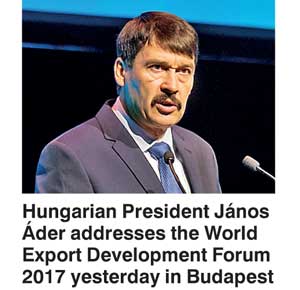Thursday Feb 19, 2026
Thursday Feb 19, 2026
Thursday, 26 October 2017 00:00 - - {{hitsCtrl.values.hits}}
Hungary’s President János Áder yesterday made a compelling case for the extension of the Paris climate deal to the maritime shipping as it is increasingly polluting the world.
After inaugurating the World Export Development Forum 2017 in Budapest, with Hungary becoming the first Central European nation to host the global event, President Ader told over 500 delegates of the need to make global trade sustainable and less polluting.
To drive home the points he was stressing, Pr esident Ader during his speech quoted twice Albert Einstein’s saying “A new type of thinking is essential if mankind is to survive and move toward higher levels”.
esident Ader during his speech quoted twice Albert Einstein’s saying “A new type of thinking is essential if mankind is to survive and move toward higher levels”.
Noting that 80% of global trade was via shipping, he said the maritime sector was responsible for 3% of global CO2 emissions and with the envisaged growth in international trade, it is forecast to account for 17% by 2050 if unchecked.
Stating that what he is proposing wouldn’t be music to the ears of shipping industry, the Hungarian President said “the Paris climate deal must be extended to the shipping and maritime sector” as well.
“The shipping industry must focus on investing to make ships more fuel efficient,” he added, at the opening of the WEDF 2017 titled ‘Trade – A Force for Good: Include, Innovate, Integrate’.
He said that global trade growth would not be sustainable unless there was growing consideration on preserving the environment. It was pointed out that any profit gained from global trade had been eroded by the degradation of the environment.
“So the focus on world trade must be not at the expense of depleting the environment or natural resources, which also means a depletion of very capital of the private sector,” added the Hungarian President.
Apart from shipping, he said the other culprit was packaging industry and asserted that a shift to more biodegradable products and alternatives must be pursued. In that context the Hungarian President commended the WEDF 2017 co-host, the International Trade Centre, for including two topical and future important sessions – ‘Green means Business’ and ‘From Waste to Wealth’.
He reiterated that the world must explore new thinking to deal with the impact arising from rapid global trade, which has risen to over 20% of global GDP from 5% in the 1950s.